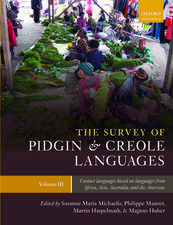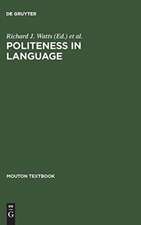Politeness: Key Topics in Sociolinguistics
Autor Richard J. Wattsen Limba Engleză Paperback – 24 sep 2003
| Toate formatele și edițiile | Preț | Express |
|---|---|---|
| Paperback (1) | 438.01 lei 6-8 săpt. | |
| Cambridge University Press – 24 sep 2003 | 438.01 lei 6-8 săpt. | |
| Hardback (1) | 698.46 lei 6-8 săpt. | |
| Cambridge University Press – 24 sep 2003 | 698.46 lei 6-8 săpt. |
Preț: 438.01 lei
Nou
Puncte Express: 657
Preț estimativ în valută:
83.81€ • 87.69$ • 69.62£
83.81€ • 87.69$ • 69.62£
Carte tipărită la comandă
Livrare economică 03-17 aprilie
Preluare comenzi: 021 569.72.76
Specificații
ISBN-13: 9780521794060
ISBN-10: 0521794064
Pagini: 320
Ilustrații: 2 b/w illus.
Dimensiuni: 140 x 216 x 17 mm
Greutate: 0.45 kg
Ediția:New.
Editura: Cambridge University Press
Colecția Cambridge University Press
Seria Key Topics in Sociolinguistics
Locul publicării:Cambridge, United Kingdom
ISBN-10: 0521794064
Pagini: 320
Ilustrații: 2 b/w illus.
Dimensiuni: 140 x 216 x 17 mm
Greutate: 0.45 kg
Ediția:New.
Editura: Cambridge University Press
Colecția Cambridge University Press
Seria Key Topics in Sociolinguistics
Locul publicării:Cambridge, United Kingdom
Cuprins
1. Introducing linguistic politeness; 2. Politeness through time and across cultures; 3. Modelling linguistic politeness I; 4. Modelling linguistic politeness II: Brown and Levinson and their critics; 5. Facework and linguistic politeness; 6. A social model of politeness; 7. Structures of linguistic politeness; 8. Relevance Theory and concepts of power; 9. Politic behaviour and politeness in discourse; 10. Politic behaviour and politeness within a theory of social practice; Glossary of terms; Bibliography.
Recenzii
'I can think of no-one in the field better qualified to write a critical introduction to linguistic politeness research than Professor Watts. He has a lively critical awareness of the shortcomings of the standard approach, an excellent overview of the presently available alternative approaches, and a willingness to work within standard theory to make the politeness research paradigm more responsive to the needs and interests of researchers around the world. There is no doubt in my mind that a critical introduction to linguistic politeness will be met with enthusiasm by the world's politeness researchers. This book is predestined to become the first standard introduction to the field.' Professor Richard W. Janney, Institüt für Englische Philologie, Ludwig-Maximilians-Universität, München
'The book as a whole is very clear and well-structured and provides both an overview and critique of existing politeness theories, but perhaps of more importance, he shows that there is nothing inherently polite about particular utterances, it is simply that some utterances may be more open to interpretation as polite than others …'. Multilingua
'This excellent volume in a new series called Key Topics on Sociolinguistics is the first textbook on this subject … This clearly written book will stretch its readers, leaving them with the sense that the field is more fertile and interesting than they may have imagined at the start … An unusually rich and stimulating textbook …'. The Times Higher Education Supplement
'… this book is a unique book length work, offering an excellent review of the literature on politeness theories and adopting a discourse analytic approach to data. As such, it will be most beneficial to both first-time travelers to the world of politeness, as well as to others with a desire to advance their knowledge within the area.' Journal of Sociolinguistics
'The book as a whole is very clear and well-structured and provides both an overview and critique of existing politeness theories, but perhaps of more importance, he shows that there is nothing inherently polite about particular utterances, it is simply that some utterances may be more open to interpretation as polite than others …'. Multilingua
'This excellent volume in a new series called Key Topics on Sociolinguistics is the first textbook on this subject … This clearly written book will stretch its readers, leaving them with the sense that the field is more fertile and interesting than they may have imagined at the start … An unusually rich and stimulating textbook …'. The Times Higher Education Supplement
'… this book is a unique book length work, offering an excellent review of the literature on politeness theories and adopting a discourse analytic approach to data. As such, it will be most beneficial to both first-time travelers to the world of politeness, as well as to others with a desire to advance their knowledge within the area.' Journal of Sociolinguistics
Descriere
This book, presents a radical way of looking at linguistic politeness.





































